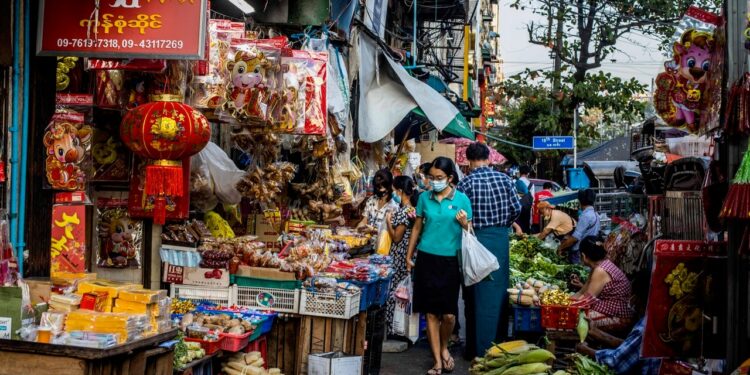Up to 3.4 million people in Myanmar could go hungry this year amid rising food prices and the loss of manufacturing, construction and services jobs, the United Nations World Food Program (WFP) warned on Thursday.
Myanmar’s banking sector has been paralyzed by strikes and major businesses have shut down since the Feb. 1 coup.
International projects have been frozen and large employers have ceased operations.
The WFP estimated that food insecurity is rising sharply in Myanmar alongside food prices and joblessness.
It said COVID-19 concerns are also accelerating the economic deterioration and humanitarian crisis.
Myanmar’s economy was already severely impacted by the COVID-19 pandemic, the WFP said.
The WFP’s country director, Stephen Anderson, said in a statement: “More and more poor people have lost their jobs and are unable to afford food.”
He called for a concerted, immediate response to alleviate suffering and to prevent an alarming deterioration in food security.
According to Myanmar’s trade unions, more than 200,000 garment workers have lost their jobs since the coup and the imposition of martial law in Yangon’s industrial areas.
Following the coup, major foreign brands, including Italy’s Benetton and Swedish retailer H&M, paused new orders from Myanmar.
Moreover, around 300,000 to 400,000 construction workers have lost their jobs since the coup, according to the trade unions.
They said all major Yangon infrastructure projects had been halted, including a South Korean industrial complex, the Japan-backed Yangon-Thanlyin Bridge and an extension at the Thilawa Special Economic Zone.
The WFP’s food monitoring index shows palm oil retail prices have risen by 20 percent since the start of February around Yangon. Rice prices around Yangon and Mandalay rose by up to 4 percent, it said.
Across Myanmar, rice prices rose by an average of 3 percent on monitored markets from mid-January to mid-February, the WFP said. In Bhamo and Putao townships in Kachin State, rice prices rose by 20 to 35 percent, it said.
Further price rises are expected because of the near paralysis of the banking sector, slowdowns in remittances and widespread limits on cash availability, the WFP said.
You may also like these stories:
Myanmar Junta Leader Set to Embark on Regional Diplomatic Offensive
Myanmar Crisis Poses a Challenge to the ‘ASEAN Way’
Dos and Don’ts for ASEAN to Avoid Complicity in the Myanmar Junta’s Crimes

















